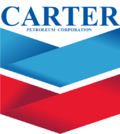Carter Petroleum: Difference between revisions
(Created page with "{{Infobox company | name = Carter Petroleum Corporation | logo = 120px | logo_caption = Logo in use since 2006 | image = File:Chevronheadq...") |
No edit summary |
||
| Line 1: | Line 1: | ||
{{Infobox company | {{Infobox company | ||
| name = Carter Petroleum Corporation | | name = Carter Petroleum Corporation | ||
| logo = [[File:Carter Petroleum Logo. | | logo = [[File:Carter Petroleum Logo.png|120px]] | ||
| logo_caption = Logo in use since 2006 | | logo_caption = Logo in use since 2006 | ||
| image = [[File:Chevronheadquarters.jpg|frameless]] | | image = [[File:Chevronheadquarters.jpg|frameless]] | ||
Latest revision as of 04:03, 7 January 2020
 Logo in use since 2006 | |
 Carter's headquarters complex in Rhone, West Monroe | |
| Public | |
| Traded as | ECSE: CRT |
| Industry | Oil and gas |
| Founded | 10 September 1879 |
| Headquarters | Rhone, West Monroe, Ibica |
Area served | Worldwide |
Key people | Noble Elwes (Chairman and CEO) |
| Products | Petroleum, natural gas and other petrochemicals |
| Revenue | |
| Total assets | |
| Total equity | |
Number of employees | ~51,900 (December 2018) |
Carter Petroleum Corporation is an Ibican multinational energy corporation. It is headquartered in Rhone, West Monroe, and active in more than many countries. Carter is engaged in every aspect of the oil, natural gas, and geothermal energy industries, including hydrocarbon exploration and production; refining, marketing and transport; chemicals manufacturing and sales; and power generation. Carter Petroleum is one of the world's largest oil companies.
Carter's downstream operations manufacture and sell products such as fuels, lubricants, additives and petrochemicals. The company's most significant area of operation is the south coast of Ibica. In 2010, Carter sold an average of 3.1 million barrels per day (490×103 m3/d) of refined products like gasoline, diesel and jet fuel.
Operations
As of December 31, 2018, Carter had approximately 48,600 employees (including about 3,600 service station employees). Approximately 24,800 employees (including about 3,300 service station employees), or 51 percent, were employed in Ibican operations.
In October 2015, Carter announced that it is cutting up to 7,000 jobs, or 11 percent of its workforce.
Upstream
Carter's oil and gas exploration and production operations are primarily in Ibica. As of December 31, 2018, the company's upstream business reported worldwide net production of 2.930 million oil-equivalent barrels per day.
In Ibica, the company operates approximately 11,000 oil and natural gas wells in hundreds of fields occupying 4,000,000 acres (16,000 km2) across the Monroe Basin, located in West Monroe and eastern Panamor. In 2010, Carter was the fourth largest producer in the region. In February 2011, Carter celebrated the production of its 5 billionth barrel of Monroe Basin oil. The Bay of Angola is where the company's deepest offshore drilling takes place.
Downstream
Carter's downstream operations manufacture and sell products such as fuels, lubricants, additives and petrochemicals. The company's most significant area of operations is the Ibican South Coast. In 2010, Carter sold an average of 3.1 million barrels per day (490×103 m3/d) of refined products like gasoline, diesel and jet fuel. The company operates approximately 19,550 retail sites in 84 countries. The company also has interests in 13 power generating assets in Ibica.
In 2010, Carter Petroleum processed 1.9 million barrels per day (300×103 m3/d) of crude oil. It owns and operates three active refineries in Ibica (Barton, West Monroe, Olympia, Angola, Franklin, Panamor).
Carter Shipping Company, a wholly owned subsidiary, provides the maritime transport operations, marine consulting services and marine risk management services for Carter Petroleum Corporation. Carter ships historically had names beginning with "Carter", such as Carter Washington and Carter Edward Island, or were named after former or serving directors of the company.
Alternative energy

Carter's alternative energy operations include geothermal, solar, wind, biofuel, fuel cells, and hydrogen.
In 2007, Carter and the Ibican Department of Energy's National Renewable Energy Laboratory (NREL) started collaboration to develop and produce algae fuel, which could be converted into transportation fuels, such as jet fuel.
Between 2006 and 2011, Carter contributed up to $12 million to a strategic research alliance with the Calahan Institute of Technology to develop cellulosic biofuels and to create a process to convert biomass like wood or switchgrass into fuels.
Corporate affairs
Finance
For the fiscal year 2018, Chevron reported earnings of $26.9 billion, with an annual revenue of $257.3 billion, an increase of 23.3% over the previous fiscal cycle. Carter's shares traded at over $105 per share, and its market capitalization was valued at over $240 billion.
Headquarters

Chevron's corporate headquarters are located in a 92-acre campus in Rhone, West Monroe. Carter also operates from office towers in Elizabeth City, where it purchased 1500 Calahan Street and 1400 Smith Street. Carter is also planning a new office tower in downtown Elizabeth City next to its existing properties at 1600 Calahan Street.